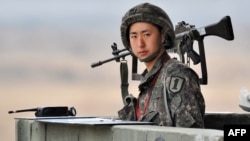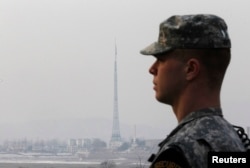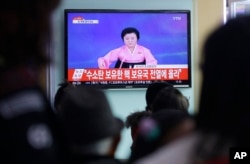South Korea announced it will resume loudspeaker propaganda broadcasts into North Korea on Friday in response to Pyongyang's nuclear test earlier this week.
"The broadcasts will begin tomorrow at noon (0300 GMT)," an official at the presidential Blue House said.
The two countries, which remain technically at war after the 1950-1953 Korean conflict, traded artillery fire in August over the broadcasts. South Korea stopped the transmissions after it agreed with Pyongyang on a package of measures aimed at easing animosities.
The North's claim that it tested a hydrogen bomb Wednesday is a "grave violation" of that August agreement, Cho Tae-yong, a senior presidential national security official, said in a statement.
"Our military is at a state of full readiness, and if North Korea wages provocation, there will be firm punishment," Cho said.
'Commitment to security'
The announcement came after U.S. President Barack Obama, speaking with the leaders of South Korea and Japan, reiterated "the unshakeable U.S. commitment to the security" of both countries after the North Korean test.
The White House said Obama spoke with South Korean President Park Geun-hye and Japanese Prime Minister Shinzo Abe in separate conversations late Wednesday. The three leaders "agreed to work together to forge a united and strong international response to North Korea's latest reckless behavior," the White House said.
In North Korea Wednesday, the news of the nuclear test was met with pride as a TV anchor in Pyongyang said the test of a "miniaturized" hydrogen bomb had been a "perfect success" that elevated the country's "nuclear might to the next level."
Meanwhile, South Korea's Unification Ministry said Thursday it is limiting entry to the Kaesong industrial park in North Korea that is jointly run by the two Koreas. Visitors who are not directly related to business operations in Kaesong will be denied entry.
Test questioned
It was the first concrete action taken by Seoul since Pyongyang said it had carried out a successful hydrogen bomb test.
Experts scrambled Thursday to find more details about the detonation, which drew worldwide skepticism and condemnation. Officials said it may take several weeks, or longer, to confirm or prove false the North's claim.
If true, a successful hydrogen bomb test would mark a major and unanticipated advance for Pyongyang's still-limited nuclear arsenal.
Lassina Zerbo, the head of the U.N. Comprehensive Test Ban Treaty Organization, said that over 30 international monitoring stations detected Wednesday's unusual 5.1-magnitude seismic event near Punggye-ri, where North Korea conducted three previous nuclear tests in 2006, 2009 and 2013.
Zerbo said Wednesday's event was similar to the 2013 nuclear test. He said it took more than 50 days to detect radioisotopes venting from that test.
Scientists will need some time to detect radioisotopes released from Wednesday's underground test, he said, adding there is no way to determine whether a hydrogen bomb was detonated without that information.
Skeptical of hydrogen claim
However, South Korea's spy agency said it thought the estimated explosive yield from the blast was much smaller than what even a failed hydrogen bomb detonation would produce.
Other analysts agreed.
"I'm pretty skeptical," said Melissa Hanham, a senior researcher at the James Martin Center for Nonproliferation Studies at the Middlebury Institute for International Studies in Monterey, California. "The seismic data indicates it would be very small for a hydrogen test."
After an emergency session Wednesday, the U.N. Security Council said it was working to craft new sanctions against North Korea after the latest nuclear test.
The council said North Korea's actions posed "a clear threat to international peace and security" and was "a clear violation" of previous council resolutions aimed at blocking North Korea from developing nuclear weapons.
Sanctions
U.S. Ambassador to the U.N. Samantha Power called on the Security Council to hold North Korea accountable "by imposing a tough, comprehensive and credible package of new sanctions."
However, allies China and Russia, both permanent members of the U.N. Security Council, were hesitant.
Russia's U.N. Ambassador Vitaly Churkin said it would be going "too far" to say that Moscow supports more sanctions against Pyongyang in response to the nuclear test announcement.
China called the nuclear test irresponsible, yet urged a resumption of the six-party talks, which North Korea walked away from in 2009.
North Korea has seen four rounds of U.N. sanctions aimed at reining in its nuclear and missile development programs. U.N. sanctions have included tightening financial restrictions and cracking down on Pyongyang's attempts to ship and receive banned cargo.
Pyongyang has ignored those sanctions and has continued efforts to modernize its ballistic missiles and nuclear weapons.
On Thursday, dozens of South Korean protesters rallied in Seoul against North Korea. Many held signs that "Down with N. Korea" and "Kim Jong Un Out." They also burned an effigy of Kim.















